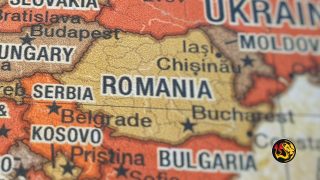
By Stefan J. Bos, Chief International Correspondent Worthy News
BUCHAREST/BUDAPEST (Worthy News) – Romania’s President Klaus Iohannis says he won’t resign on December 21 as planned but will leave after a new head of state is elected.
He addressed the nation late Friday after the Constitutional Court annulled the presidential elections, citing irregularities after security services suggested pro-Russian candidate Călin Georgescu won the first round due to Russian interference.
He was to face liberal Elena Lasconi in a runoff on Sunday, December 8. Lasconi is fiercely pro-NATO and pro-European Union and could become Romania’s first woman president. She condemned the court ruling, saying it “tramples Romania’s democracy.”
New presidential elections are now due in February or March after a new government is installed following Sunday’s parliamentary vote, which was held separately from the presidential poll.
“According to the Romanian constitution, the president continues his mandate until the new president takes his oath. So when the new president will be invested, that is when I leave as president,” Iohannis explained in televised remarks.
He said he has no ambition to become the next prime minister. Iohannis said he agreed with the Constitutional Court ruling. Following [the first round of the presidential] elections, I started receiving notes from intelligence services about some strange things,” Iohannis recalled.
“I received the reports, and I was very worried about what I read, so I convened the Romanian National Security Council,” he explained. “The conclusions were grave.”
ILLEGAL SUPPORT
He said it became clear that Georgescu benefitted from “massive illegal election support” despite declaring “zero spending on his election campaign.”
Iohannis said he “received information from services” that the pro-Russia candidate “was illegally supported by a foreign country, which constitutes a national security matter.”
Georgescu ran a successful campaign on the social media platform TikTok.
His popularity exploded in the weeks before the vote, with the candidate gaining tens of millions of views days before the first round, apparently in a campaign backed by Moscow.
Iohannis’ words confirmed Romania’s intelligence agencies’ statements that Georgescu’s win was “not a natural outcome” and that a coordinated social media campaign by a “state actor” artificially propped up his victory.
The documents showed that an alleged pre-organized sleeper network suddenly became active two weeks before the election.
Romanian intelligence concluded that the network used methods typical of a state actor in recruiting and coordinating with others through the messaging platform Telegram.
1 MILLION SPENT
The documents also found that almost 1 million euros ($1.056,000) was spent during the campaign by an individual who supported Georgescu’s candidacy.
Georgescu, who raised eyebrows with his fringe beliefs and expressed support of Romanian World War II Nazi leaders, claimed he had no campaign budget and was helped through volunteers.
On Friday, he said the Constitutional Court decision “is more than a legal controversy. It is basically a formalized coup d’état.”
In televised remarks, he said: “Dear friends, we are in the Christmas fast, and today is St. Nicholas Day. On this day, the Romanian state has taken democracy and trampled it underfoot.”
Yet government leaders in the European Union and the United States view him as a danger to Romania’s fragile democracy, which was introduced after the 1989 Romanian Revolution, following decades of dictatorship.
Despite the turmoil, President Iohannis said, “Romania is a safe, solid country” that will overcome the latest hardships.
Romania is a crucial member state of the NATO military alliance as it has a long border with war-torn Ukraine. It has supported Ukraine with military aid to halt the Russian offensive.
Copyright 1999-2026 Worthy News. This article was originally published on Worthy News and was reproduced with permission.
Latest News from Worthy News
Saudi Arabia has launched the largest reconstruction initiative in Syria since U.S. sanctions were lifted, positioning the kingdom as a central driver of Syria’s postwar recovery.
Ukrainian President Volodymyr Zelenskyy said the United States has given Kyiv and Moscow another deadline to reach a peace agreement, proposing that the nearly four-year war should end by June, as Russia escalates air strikes against Ukraine’s energy infrastructure.
Israeli Prime Minister Benjamin Netanyahu is scheduled to meet Wednesday with President Donald Trump at the White House, as negotiations with Iran enter a decisive and potentially volatile phase. The meeting, set for 11:00 a.m. Washington time, will mark Netanyahu’s seventh face-to-face encounter with Trump since the U.S. president began his second term, underscoring the unusually close relationship between the two leaders.
With the deadline to fund the Department of Homeland Security only days away, Democrats have refused an offer from the White House to strike a compromise over Immigrations and Customs Enforcement changes.
President Donald Trump is weighing deploying a second aircraft carrier to the Middle East as the U.S. continues talks with Iran over its nuclear program.
Ahead of the 2026 midterm elections, Republicans in Congress are pushing forward multiple bills that would standardize election security requirements nationwide.
Kenya has condemned as “unacceptable” the recruitment of its citizens to fight for Russia in Ukraine, amid reports that several Kenyans have been killed or wounded on the battlefield as the war approaches its fourth anniversary.







